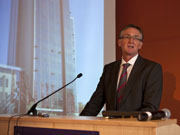News
UNI says Iceland economic crisis shows flaws in global banking system

UNI Global Union said that Iceland’s banking collapse is emblematic of the lax oversight and shady deals that plagued the global banking system and led to the world economic collapse.
UNI General Secretary Philip Jennings said it is imperative that regulators are confident that the new measures they have put in place will prevent a repeat of this in any nation anywhere.
“The lessons learned in Iceland are instructive to trade unions around the world,” said Jennings. “The financial crisis has brought a collapse in the real economy. In the weeks and months ahead UNI Global Union will be asking the question of the G20, the IMF, the World Bank and regulators everywhere, ‘What measures have you put in place to prevent a repeat of the Icelandic financial collapse?’”
Last week Jennings was with Icelandic president Olafur Ragnar Grimsson at a meeting of the Confederation of the Nordic Bank, Finance and Insurance Unions, which brings together finance workers through the Nordic area. They spoke to the group just a few days after a truth commission report revealed many of the missteps that led to Iceland’s banking collapse.
“The engagement of unions in regulatory reform has never been more important,” said NFU President Jorunn Berland.
Grimsson said that free market ideology led to the country’s financial collapse as the banks set up incentives that tied profits to selling complicated products that most customers did not understand.
“At the pinnacle of this system, of course, were the elaborate bonus schemes for the top officials of the banks and other financial companies,” Grímsson said. He said the banks had lost sight of their main purpose.
“The key lesson is never to lose sight of the social responsibilities of financial institutions, and never to cut corners when fundamental, democratic principles are at stake,” he said.
A report released last week by a truth commission formed to find the root causes of Iceland’s 2008 banking collapsed, revealed a tangled web of corruption and smoke and mirrors reporting that masked all the weaknesses in the country’s banking system. The banking fiasco led to an economic crisis in Iceland that has debilitated the country for the past two years.
The report says the “main cause of the failure of the banks was the rapid growth of the banks and their size at the time of the collapse.” The top three banks in the country grew so quickly (20-fold in size in seven years) that they were plagued by poor underwriting or record-keeping, which can-- and did-- lead to solvency-related difficulties. This led to a sharp decrease in the quality of Icelandic banks’ loan portfolios.
Last week UNI organised a global action week for bank workers to share their stories of unscrupulous sales pressure from banks. Under the motto “Fair Banking Advice? Fair Working Conditions? Now!” finance workers joined the push to change what is a global problem for bank workers.
UNI Finance Global Union, German union ver.di, bank workers and representatives of finance unions in Europe were in Frankfurt on Friday to demonstrate in front of the headquarters of the European Central Bank to call for a radical change in the sales practices of financial service providers. Other actions took place in countries ranging from France to Australia.

